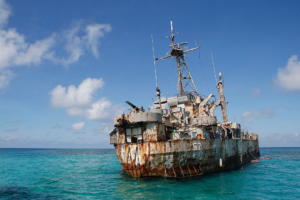Philippines may bring sea dispute with China to UN General Assembly
THE PHILIPPINES is looking at bringing its sea dispute with China to the United Nations (UN) General Assembly, a congressman said on Wednesday, a move that could put pressure on Beijing to ease its militarization of the South China Sea.

By Kenneth Christiane L. Basilio, Reporter
THE PHILIPPINES is looking at bringing its sea dispute with China to the United Nations (UN) General Assembly, a congressman said on Wednesday, a move that could put pressure on Beijing to ease its militarization of the South China Sea.
The Department of Foreign Affairs (DFA) is studying the implications of submitting a resolution to the body, which serves as the UN’s main policy-making organ, since it “is not the venue for political debates,” Nueva Ecija Rep. Joseph Gilbert F. Violago said in plenary as he sponsored the agency’s budget at the House of Representatives.
The General Assembly has taken action across all pillars of the UN, including in regard to political, economic, humanitarian, social and legal matters, according to the UN website.
Tensions between the Philippines and China have worsened in the past year as Beijing continues to block resupply missions to Second Thomas Shoal, where Manila has a handful of troops stationed at a beached vessel.
“The DFA plans to file a resolution with the UN General Assembly regarding the Philippines’ territorial claims in the West Philippine Sea,” Mr. Violago told the floor in Filipino.
“The recommendation to file a particular resolution with the United Nations General Assembly would be… subject to necessity and prudence,” he said. “The department appreciates the recommendation and continues to study its implications.”
“The possible resolution is supported by Articles 34 and 35 of the UN Charter, which allows member states to submit a resolution either to the UN General Assembly or UN Security Council if there is a dispute which can later on threaten international peace and security,” Josue Raphael J. Cortez, a lecturer at the School of Diplomacy and Governance of De La Salle-College of St. Benilde, told BusinessWorld in a Facebook Messenger chat.
He said tensions with China are a “potent threat,” and the Philippines has all the reasons to bring the case to the UN. “At the same time, given that diplomatic protests seem not to work anymore — and despite talks and pressures being exerted by the Philippines’ international partners, China seems to be unfazed — then it is already a signal for us to do more to address the issue.”
Mr. Cortez said the resolution should not just emphasize the rules-based international order. “It should also highlight the fact that this tension, should it continue, is not merely threatening the country’s peace and security but also of the entire region.”
The UN General Assembly meets in regular sessions in New York City from September to December each year.
Philippine President Ferdinand R. Marcos, Jr. this year opted not to attend this year’s session, the Presidential Communications Office said in a statement last week. He will instead be represented by Foreign Affairs Secretary Enrique A. Manalo.
PEACEFUL RESOLUTION
The Philippine government has provided the Foreign Affairs department with flexibility to act on its own “to promote and protect national integrity, territorial integrity and the national interest,” Mr. Violago said.
He added that the Philippines through the DFA would continue to hold talks with China for a peaceful resolution of their sea dispute. “The most effective way to ease tensions is still through communications,” he said in Filipino.
Philippine and Chinese envoys last week held diplomatic talks in Beijing on how to ease sea tensions, even as both sides insist on upholding their sovereignty rights over features in the South China Sea.
The DFA said Undersecretary Ma. Theresa P. Lazaro met with Chinese Vice Foreign Minister Chen Xiaodong in Beijing, where the Philippine side reiterated that the Sabina Shoal, the site of recent collisions between their coast guard vessels, is part of the Philippines’ exclusive economic zone.
The Chinese Foreign Ministry said both countries had a “candid and in-depth exchange of views,” with Beijing renewing its call for Manila to remove an “illegally anchored” vessel at Sabina.
The Southeast Asian nation on Sept. 14 recalled BRP Teresa Magbanua, its biggest coast guard vessel, from Sabina Shoal amid Chinese pressure to leave the disputed atoll.
The ship had been anchored the Sabina Shoal since April to monitor what it suspects to be China’s small-scale reclamation activities. This has angered China, turning the shoal into their latest flashpoint in the disputed waterway.
Sabina Shoal has been a staging ground for Philippine resupply missions to Second Thomas Shoal, where it grounded a World War II-era vessel in 1999 to serve as an outpost for a handful of Filipino troops.
China claims sovereignty over most of the South China Sea, overlapping into maritime zones of Brunei, Indonesia, Malaysia, the Philippines, and Vietnam.
In 2016, a United Nations-backed tribunal in the Hague voided China’s expansive and historical claims for being illegal. Beijing has rejected the ruling.
Both countries held the first round of bilateral talks this year in Manila, where they agreed on a “provisional arrangement” on resupply missions at Second Thomas Shoal and new lines of communications to improve their handling of sea disputes.














